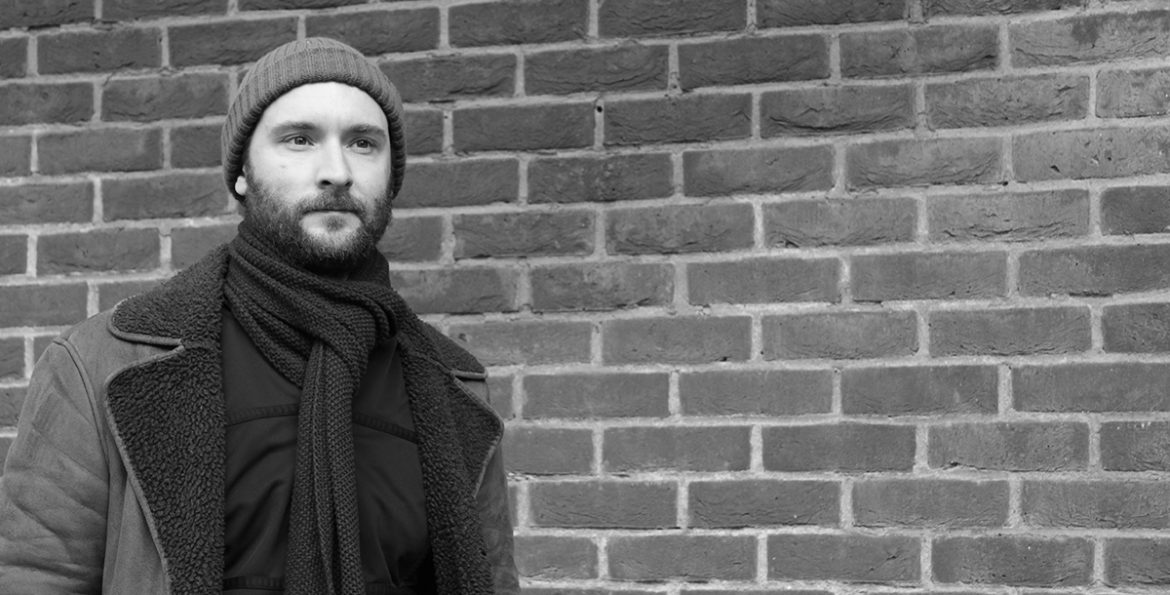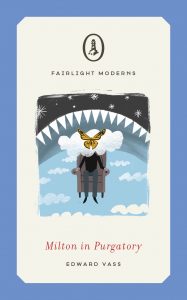

Edward Vass: Interview
- 6th August 2019
- Category : Author,Blog,Interviews & Blogs
Edward Vass‘s debut novella, Milton in Purgatory, has been published by Fairlight Books on 1 August 2019. In this novellas we follow Milton, a 26-year-old unhappy with his job, during his last day on earth – he is hit by a car on his way to work. But this is just the beginning of his journey. Read this interview with Edward to find out what inspired him to write Milton in Purgatory and about his path to writing.
Did you always want to be a writer?
Possibly – I’ve always dreamt of having the time to write. I’m not sure I was ever certain what the job description ‘writer’ involved. It’s always just been an exciting edition to whatever career path I find myself on. Being dyslexic meant that I felt I never had the tools, or even the entry requirements, to study, to write to a professional level. But as I lived, I’ve grown to understand writing is far more than study – it’s deep rich voices, emotions, viewpoints and life – and am now beginning to feel very much like a writer/author – as well as a number of other things.
Milton in Purgatory is your debut novella; have you ever experimented with any other stories or formats before?
Lots! Not sure why, but for better or worse my focus has always been on long form stories – which is probably why Milton in Purgatory is the first story I’ve completed to this standard.
How did you start writing?
My Mum’s a writer, so creative writing has always felt natural, and writing a book an achievable goal. That said, I didn’t write anything with even an ounce of substance until my late-twenties when I had lived and learnt enough to start to develop a voice.
If you could describe Milton in Purgatory in one word what would it be?
Odd.
What inspired you to write Milton in Purgatory?
 My conflicted view of religion – particularly the afterlife. It’s a really bleak view, but to me, evolution seems to be correct, and death is nothing more than lights out. Less bleak is the religious take on things, however, I have issues getting behind a philosophy imbedded in, at best, conflicted, ancient stories. So, I was inspired to start writing the sort of afterlife a person in the modern age could get behind.
My conflicted view of religion – particularly the afterlife. It’s a really bleak view, but to me, evolution seems to be correct, and death is nothing more than lights out. Less bleak is the religious take on things, however, I have issues getting behind a philosophy imbedded in, at best, conflicted, ancient stories. So, I was inspired to start writing the sort of afterlife a person in the modern age could get behind.
With Milton’s journey through afterlife you created a whole new image of Purgatory, one that’s significantly different from the traditional one. What was the process behind creating this fantastical world with its own laws and strange characters?
The world building was massively aided by the fact that most readers will come to the story pre-loaded with a lifetime of knowledge about the afterlife. Narnia or Middle-earth need pages of description, but all I needed to do was twist common knowledge with my own unsteady imagination and send Milton spiralling through it.
What does Milton’s journey signify for you?
A need I think we all have – to do something in life which is unique and important. For me it was writing Milton in Purgatory, and for Milton, it was dying.
What’s the most surprising thing you’ve learned through your writing?
How other people view my writing in comparison to me. Words that I would never use to describe myself, or my writing, or Milton in Purgatory, have come to the surface in the editing and review process, and most of them are spot on!
What has been the hardest part of Milton in Purgatory to write?
Trying to get a balance between fantasy and reality was exhausting. I want everyone who reads this to be able to imagine themselves on the same journey, always wondering what they would do in the same situation – a difficult task when dealing with ethereal plans. To anchor the story and make each moment feel as real as possible, I had to focus on the practicalities of taking a journey through the afterlife. What to wear? Where the toilets are? Will death make me late for work?
What do you hope people take away from reading Milton in Purgatory?
A refusal to accept the characteristics of our society that don’t feel relevant anymore. A bit heavy I know – sorry. I’d be happy ‘with a few laughs’ also. But it is the concept of putting your own stamp on the philosophy you live by that the book revolves around. A line in a Tim Minchin song that I like says: ‘just because ideas are tenacious it doesn’t mean they’re worthy’. I want people to take away the idea that belief should always be on your own terms, and can be whatever you want it to be. Perhaps it doesn’t have to be rigidly set against the writings of someone who, frankly, is far less qualified than yourself (due to many generations of being dead) to be making such decisions for you. Or perhaps – if that makes you happy.
What do you think makes a good novella?
Brevity! There isn’t time to do everything in a novella – so you need to find a creative way of telling your story.
What does writing mean to you?
Writing allows me to keep a very personal type of creativity as a constant in my busy life.
What inspires your writing?
Probably my desire to take ideas and concepts that excite me, learn more about them, and see if I can make them my own.
Do you have a writing schedule?
I wish! I do get a lot of time to write – but my busy family life means that I need to grab the chance to write when available.
What’s your favourite book/author?
Hard-Boiled Wonderland and the End of the World has been my favourite book for a number of years now. Haruki Murakami wrote it in 1985 – it moves between two parallel narratives which circle each other in a beautifully unique way. Every aspect of the story is perfect for me, the laid-back manner of the unnamed protagonist, the effortless cool of the writing, the adventure of a subterranean urban landscape filled with scientists and monsters, Murakami’s calling card of great dialogue with tinge of detective noir, all set against a sci-fi infused Tokyo backdrop. I bloody love it!
Do you have a pet peeve when it comes to writing? Something you notice yourself doing or something you pick-up in other’s writing?
Over explaining – a classic. Very easy to notice in other authors’ writing, but very difficult to see in your own. I have great respect for writers who instinctively know what needs to be said, and what is more powerful being left unsaid.
Do you have a writer’s habit that helps you ‘get in the zone’?
No, aside from imagining myself in the situation of my characters, visualising the people and items around them, and taking note of their feelings about these things. I think I need to adopt an author affectation, ideas to insta please – edward_vass_author
What’s a piece of advice you can give to aspiring authors?
Create something authentic, imaginative, and always write a little bit stranger than feels comfortable.
Place your order for Milton in Purgatory here, or for book bundle options for the Fairlight Moderns visit our online shop.














